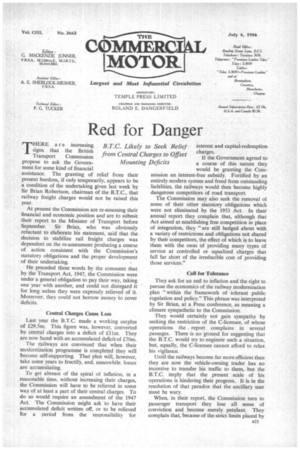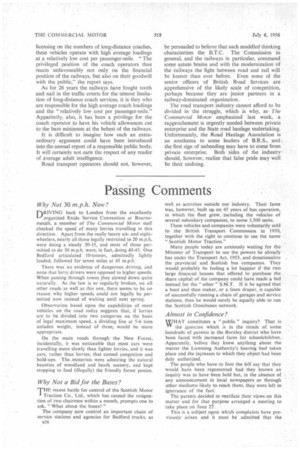Red for Danger
Page 35

Page 36

If you've noticed an error in this article please click here to report it so we can fix it.
B.T.C. Likely to Seek Relief from Central Charges to Offset Mounting Deficits
THERE a r e increasing Signs that the British Transport Commission propose to ask the Government for some kind of financial assistance. The granting of relief from their present burdens, if only temporarily, appears to be a condition of the undertaking given last week by Sir Brian Robertson, chairman of the B.T.C., that railway freight charges would not be raised this year.
At present the Commission are re-assessing their financial and economic position and are to submit their report to the Minister of Transport before September. Sir Brian, who was obviously reluctant to elaborate his statement, said that the decision to stabilize rail freight charges was dependent on the re-assessment Producing a course of action consistent with the Commission's statutory obligations and the proper development of their undertaking.
He preceded these words by the comment that by the Transport Act, 1947, the Commission were under a general obligation to pay their way, taking one year with another, and could not disregard it for long unless they were expressly relieved of it. Moreover, they could not borrow money to cover deficits.
Central Charges Cause Loss Last year the B.T.C. made a working surplus of £29.5m. This figure was, however, converted by central charges into a deficit of Blm. They are now faced with an accumulated deficit of £70m.
The railways are convinced that when their modernization programme is completed they will become self-supporting. That plan will, however, take some years to fructify, and, meanwhile, losses are accumulating.
To get abreast of the spiral of inflation, in a reasonable time, without increasing their charges, the Commission will have to be relieved in some way of at least a part of their central charges. To do so would require an amendment of the 1947 Act. The Commission might ask to have their accumulated deficit written off, or to be relieved for a period from the responsibility for interest and capital-redemption charges.
If the Government agreed to a course of this nature they would be granting the Commission an interest-free subsidy. Fortified by an entirely modern system and freed from outstanding liabilities, the railways would then become highly dangerous competitors of road transport.
The Commission may also seek the removal of some of their other statutory obligations which were not eliminated by the 1953 Act. In their annual report they complain that, although that Act aimed at establishing free competition in place of integration, they "are still hedged about with a variety of restrictions and obligations not shared by their competitors, the effect of which is to leave them with the onus of providing many types of service at controlled or equalized charges that fall far short of the irreducible cost of providing those services."
Call for Tolerance They ask for an end to inflation and the right to pursue the economics of the railway modernization plan "within the framework of tolerant public regulation and policy." This phrase was interpreted by Sir Brian, at a Press conference, as meaning a climate sympathetic to the Commission.
They would certainly not gain sympathy by seeking the restriction of the C-licensee, of whose operations the . report complains in several passages. There is no ground for suggesting that the B.T.C. would try to engineer such a situation, but, equally, the C-licensee cannot afford to relax his vigilance.
Until the railways become far more efficient than they are now the vehicle-owning trader has no incentive to transfer his traffic to them, but the B.T.C. imply that the present scale of his operations is hindering their progress. It is in the resolution of that paradox that the ancillary user must be wary.
When, in their report, the Commission turn to passenger transport they lose all sense of conviction and become merely petulant. They complain that, because of the strict limits placed by licensing on the numbers of long-distance coaches, these vehicles operate with highaverage loadings at a relatively low cost per passenger-mile. "The privileged position of the coach operators thus reacts unfavourably not only on the financial position of the railways, but also on their goodwill with the public," the report says.
As for 26 years the railways have fought tooth and nail in the traffic courts for the utmost limitation of long-distance coach services, it is they who are responsible for the high average coach loadings and the "relatively low cost per passenger-mile." Apparently, also, it has been a privilege for the coach operator to have his vehicle allowances cut to the bare minimum at the behest of the railways.
It is difficult to imagine how such an extraordinary argument could have been introduced into the annual report of a responsible public body. It will certainly not earn the respect of any reader of average adult intelligence.
Road transport operators should not, however, be persuaded to believe that such muddled thinking characterizes the B.T.C. The Commission in general, and the railways in particular, command some astute brains and with the modernization of the railways the fight between road and rail will be keener than ever before. Even some of the senior officers of British Road Services are apprehensive of the likely scale of competition, perhaps because they are junior partners in a railway-dominated organization.
The road transport industry cannot afford to be divided in the struggle, which is why, as The Commercial Motor emphasized last week, a rapprochement is urgently needed between private enterprise and the State road haulage undertaking. Unfortunately, the Road Haulage Association is an anathema to some leaders of B.R.S., and the first sign of unbending may have to come from private enterprise. Both sides of the industry should, however, realize that' false pride may well be their undoing.
























































































































